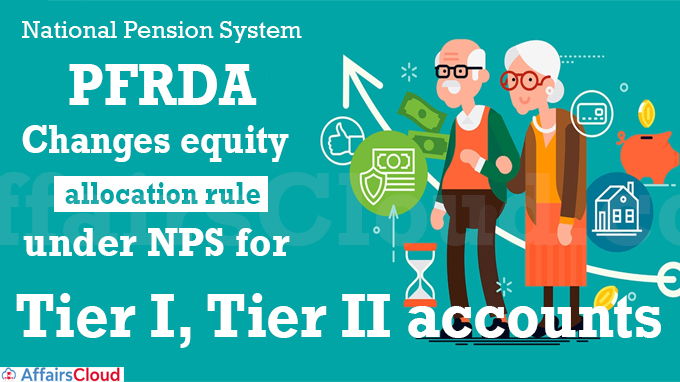 The Pension Fund Regulatory and Development Authority (PFRDA) has revised the equity allocation standards for Tier 1 and Tier II National Pension System (NPS) accounts.
The Pension Fund Regulatory and Development Authority (PFRDA) has revised the equity allocation standards for Tier 1 and Tier II National Pension System (NPS) accounts.
- The PFRDA has issued the new regulations in accordance with the powers granted by sub-clause (b) of sub-section (2) of Section 14 read with Section 23 of the PFRDA Act, 2013, and sub-regulation (1) of Regulation 14 of the PFRDA (Pension Fund) Regulations, 2015, as modified from time to time.
PFRDA New Regulations
i.The new regulation states that subscribers can allocate up to 75% of their funds to Equity (E) under active choice in a Tier-I account from the age of 51 years without any tapering requirements.
ii.In addition, PFRDA has decided to allocate 100% of subscriber contributions to Asset Class E (Equity) in Tier-II accounts (optional accounts) under the active choice without any tapering conditions.
Key Points:
i.Under the NPS-All Citizen Model, NPS subscribers currently have the option to select any one of the registered pension funds and actively distribute their contributions across four asset classes: Equity (E), Corporate Bonds (C), Government Securities (G), and Alternative Assets (A) with “Active Choice” option.
- Individuals who voluntarily subscribe to NPS are designated as All Citizen Sector.
Maximum Allocations to Various Asset Classes
| Asset Class | Maximum Limit |
|---|---|
| Asset Class G (Government Securities) | 100% |
| Asset Class C (Corporate Bonds) | 100% |
| Asset Class E (Equity) | 75% |
| Asset Class A (Alternate Assets) | 5% |
ii.The 75% ceiling on Asset Class E (Equity), however, is reduced by 2.5% annually and reallocated to government securities once a subscriber reaches the age of 51 years.
Age-Based Maximum Equity Threshold
| Age | 50 | 51 | 52 | 53 | 54 | 55 | 56 | 57 | 58 | 59 | 60 & above |
| Maximum Equity | 75 | 72.5 | 70 | 67.5 | 65 | 62.5 | 60 | 57.5 | 55 | 52.5 | 50 |
List of Restrictions On Asset Class Exposure That Will Now Be Imposed to All Tier II Subscribers & Tier I Subscribers in The Private Sector
| Tier –I | |
| Asset Class | Max limit |
| Asset Class G (Government Securities) | 100% |
| Asset Class C (Corporate Bonds) | 100% |
| Asset Class E (Equity) | 75% |
| Asset Class A (Alternate Assets) | 5% |
| Tier-II | |
| Asset Class | Max limit |
| Asset Class G (Government Securities) | 100% |
| Asset Class C (Corporate Bonds) | 100% |
| Asset Class E (Equity) | 100% |
| Asset Class A (Alternate Assets) | 5% |
Click here to read the official notification
Note: The PFRDA also issued guidelines to handle the NPS corpus of deceased subscribers.
National Pension System (NPS)
i.The NPS is a voluntary retirement savings scheme designed to allow subscribers to make defined contributions toward planned savings, safeguarding the future in the form of a pension.
- Under the NPS, Employers are permitted to contribute to their employees’ social security/welfare benefits.
ii.The NPS became mandatory for all Central Government recruits on January 1, 2004 (excluding the armed forces).
- It replaced the prior defined benefit pension, and has since been adopted by nearly all state governments for their employees.
- In 2009, it was made available to all sections.
The NPS account has two different account types: Tier I & Tier II.
i.A Tier-I is the Individual Pension Account, which is the default pension account and receives all of the tax incentives under the Income Tax Act.
ii.A Tier-II account is an Optional Investment Account available to subscribers who have an active Tier-I account.
- There are no withdrawal limitations and tax benefits with this account. Tier-II accounts are not pension accounts.
Recent Related News:
In July 2022, Bank of India (BOI) became the first bank to launch a Unified Payments Interface (UPI)-enabled digital portal for enrollment of National Pension System (NPS) in collaboration with K-fintech. The digital approach entails scanning QR codes, Aadhar verification with Digilocker, and payment through UPI.
About Pension Fund Regulatory and Development Authority (PFRDA):
Chairman – Supratim Bandyopadhyay
Establishment – 2003
Headquarters – New Delhi, Delhi




